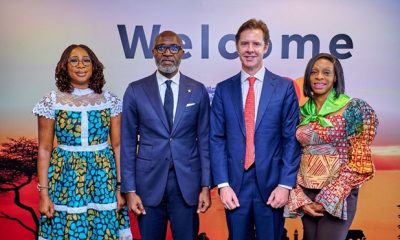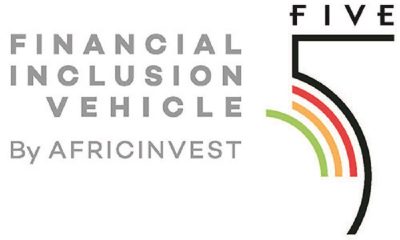Economy
Banker Urges SMEs to Monitor, Adjust Expenditure

By Aduragbemi Omiyale
Business owners in the Small and Medium Enterprises (SMEs) sector have been urged to develop the habit of monitoring their expenditure and make adjustments where necessary.
This advice was given by the CEO of Stanbic IBTC Bank Plc, Mr Wole Adeniyi, at a webinar themed Scaling Your Business in Challenging Economic Times.
He argued that the COVID-19 crisis and the economic situation in Nigeria have not been friendly to the sector, noting that for the survival of any business, it was the best thing to do now.
However, he said Stanbic IBTC Bank will continue to support SMEs to over the challenges, stating that, “As a business entity, Stanbic IBTC understands that running a business is not a bed of roses and that challenges differ from one business ecosystem to another. For this reason, Stanbic IBTC Bank is always in search of solutions to solve business challenges as they arise.”
Mr Wole also advocated the diversification of the economy through policies that will be aimed at driving commercial growth in various sectors, as SMEs are vital to the vast business ecosystem of any economy.
According to him, this would boost economic growth and lead to an improved standard of living for the citizenry.
Speaking on how the pandemic affected SMEs and the outlook of the post-pandemic era, another speaker at the event, Mr Ayodele Ojosipe, Head, Enterprise Banking, Stanbic IBTC Bank, explained that challenges faced by SMEs during the lockdowns still have profound effects on their businesses to date.
He added that whilst these challenges have resulted in increased costs of doing business, the inability of most SMEs to pass these costs to their customers has led to margin compression and outright losses in most cases thereby threatening their business sustainability.
Mr Ayodele stated further that despite the fluctuation and devaluation of the currency which has culminated in capital inadequacy for most SMEs in Nigeria, there are opportunities in the immediate business environment that small businesses can explore to turn the tide.
He advised SMEs to take advantage of the Stanbic IBTC unsecured SME Loan which is available to both existing and new clients of the Bank within 24hrs to enable them to meet their financing needs.
The banker identified changes in business dynamics, client focus, optimising cash flows and business partnerships, talent retention, restructuring loans (if any), deferring costs and accessing cheaper funding as key focus areas for SMEs to guarantee business continuity.
He further cited aspects of the recently promulgated Finance Act which would benefit small businesses. Some of the areas include the Company Income Tax Act, which stipulates those small businesses with less than N25 million turnover will no longer have to pay taxes and the CAMA act which states that small businesses with a turnover of less than N120 million need not turn in audited financials while filing their taxes, hence saving them costs in the appointment of auditors.
On her part, the founder of AGS Tribe, Ms Ife Durosimi-Etti, highlighted the need for small businesses to explore innovative ways of staying relevant through identifying what customers need.
She harped on the advantages of collaborations with other business owners, avoiding unnecessary loans, seeking opportunities for grants, and the importance of joining accelerator programmes for exposure.
Economy
NASD Exchange Rises 1.22% on Sustained Bargain-Hunting

By Adedapo Adesanya
Strong appetite for unlisted stocks further raised the NASD Over-the-Counter (OTC) Securities Exchange by 1.22 per cent on Friday, February 27.
Data revealed that the NASD Unlisted Security Index (NSI) was up by 49.41 points to 4,083.87 points from 4,034.46 points, and lifted the market capitalisation by N19.56 billion to N2.433 trillion from N2.413 trillion.
The volume of securities bought and sold by investors increased by 243.0 per cent to 4.5 million units from 1.3 million units, and the number of deals grew by 15.8 per cent to 44 deals from 38 deals, while the value of securities went down by 19.7 per cent to N82.5 million from N102.8 million.
Central Securities Clearing System (CSCS) Plc ended the session as the most active stock by value on a year-to-date basis with 35.0 million units valued at N2.1 billion, followed by Okitipupa Plc with 6.3 million units worth N1.1 billion, and Geo-Fluids Plc with 122.8 million units transacted for N480.4 million.
Resourcery Plc ended the day as the most traded stock by volume on a year-to-date basis with 1.05 billion units sold for N408.7 million, followed by Geo-Fluids Plc with 122.8 million units valued at N480.4 million, and CSCS Plc with 35.0 million units traded for N2.1 billion.
There were six price gainers yesterday led by FrieslandCampina Wamco Nigeria Plc, which added N9.02 to close at N111.46 per unui compared with the previous day’s N102.44 per unit, Nipco Plc appreciated by N6.00 to N284.00 per share from N278.00 per share, CSCS Plc recouped N1.87 to sell at N70.12 per unit versus Thursday’s value of N68.25 per unit, Geo-Fluids Plc improved by 17 Kobo to close at N3.18 per share versus N3.01 per share, Industrial and General Insurance (IGI) Plc advanced by 5 Kobo to sell at N50 Kobo per unit versus the preceding day’s 45 Kobo per unit, and Acorn Petroleum Plc chalked up 2 Kobo to settle at N1.34 per share, in contrast to the previous day’s N1.32 per share.
Economy
FX Liquidity Crunch Sinks Naira to N1,363/$1 at NAFEX, N1,370/$1 at Black Market

By Adedapo Adesanya
The Naira performed poorly against the United States Dollar in the different segments of the foreign exchange (FX) market on February 27, closing the week without a gain.
In the black market, the domestic currency weakened against the Dollar yesterday by N5 to close at N1,370/$1 compared with Thursday’s closing price of N1,365/$1, and at the GT Bank forex desk, it lost N2 to sell N1,369/$1 versus the N1,367/$1 it was sold a day earlier.
Yesterday, the Nigerian Naira lost N3.75 or 0.26 per cent against the greenback at the Nigerian Autonomous Foreign Exchange Market (NAFEX) to trade at N1,363.39/$1 compared with the previous day’s N1,359.82/$1.
Also, the Naira depreciated against the Euro at the official market during the session by N2.33 to quote at N1,609.22/€1 versus N1,606.89/€1, and appreciated against the Pound Sterling by N6.74 to settle at N1,836.49/£1 compared with the preceding session’s N1,843.23/£1.
The Naira’s latest depreciation occurred as FX demand continued to outpace available supply, intensifying pressure in the market.
In response to the negative momentum, the Central Bank of Nigeria (CBN) intervened by selling Dollars to banks and other authorised dealers in an effort to stabilise the local currency. The move came barely a week after the apex bank had purchased about $190 million from the foreign exchange market to temper the Naira’s rally.
Specifically, the CBN injected $200 million into the official market between Tuesday and Wednesday through an intervention call. However, the liquidity support proved insufficient to reverse the currency’s downward trend.
Meanwhile, the cryptocurrency market declined on Friday, with Solana (SOL) down by 10.4 per cent to $78.60, as Dogecoin (DOGE) decreased by 9.5 per cent to $0.0982.
Further, Cardano (ADA) slumped 8.9 per cent to $0.2647, Ethereum (ETH) slipped by 8.6 per cent to $1,859.10, Ripple (XRP) shrank by 8.2 per cent to $1.30, Litecoin (LTC) lost 1.4 per cent to close at $52.39, Bitcoin (BTC) slid 5.9 per cent to $63,686.39, and Binance Coin (BNB) went down by 4.9 per cent to $596.64, while the US Dollar Tether (USDT) and the US Dollar Coin (USDC) traded flat at $1.00 apiece.
Economy
Oil Prices Climb on Geopolitical Anxiety

By Adedapo Adesanya
Oil prices rose about 2 per cent on Friday, with traders bracing for supply disruptions as nuclear talks between the United States and Iran were without an agreement.
Brent crude futures settled at $72.48 a barrel after chalking up $1.73 or 2.45 per cent, while US West Texas Intermediate crude futures finished at $67.02 a barrel, up $1.81 or 2.78 per cent.
The two sides agreed to extend indirect negotiations into next week, but traders grew sceptical that an agreement between US President Donald Trump’s administration and Iran was possible.
The US and Iran held indirect talks in Geneva on Thursday after Mr Trump ordered a military buildup in the region.
Oil prices gained during the talks, on media reports indicating that discussions had stalled over U.S. insistence on zero enrichment of uranium by Iran. However, prices eased after the mediator from Oman said the two sides had made progress.
They plan to resume negotiations with technical-level discussions scheduled next week in Vienna, Omani Foreign Minister Sayyid Badr Albusaidi said on X.
Market analysts noted that geopolitical risk premiums of $8 to $10 a barrel have been built into oil prices on fears that a conflict will disrupt Middle East supply through the Strait of Hormuz, where about 20 per cent of global oil supply passes.
To cushion the impact from a possible strike, one of the world’s largest oil producers, the United Arab Emirates (UAE), is set to export more of its flagship Murban crude in April, while Saudi Arabia said it would also increase oil production.
Additionally, Saudi Arabia may raise its April crude price to Asia for the first time in five months due to higher demand from India to replace Russian supplies, potentially raising it by about $1 a barrel.
Meanwhile, the Organisation of the Petroleum Exporting Countries and its allies (OPEC+) is likely to consider raising oil output by 137,000 barrels per day for April at its March 1 meeting, after suspending production increases in the first quarter.
The resumption of output increases after a three-month pause would allow Saudi Arabia and the UAE to regain market share at a time when other OPEC+ members, such as Russia and Iran, contend with Western sanctions while Kazakhstan recovers from a series of oil production setbacks.
Eight OPEC+ producers – Saudi Arabia, Russia, the United Arab Emirates, Kazakhstan, Kuwait, Iraq, Algeria and Oman will meet at the meeting on Sunday.
-

 Feature/OPED6 years ago
Feature/OPED6 years agoDavos was Different this year
-
Travel/Tourism10 years ago
Lagos Seals Western Lodge Hotel In Ikorodu
-

 Showbiz3 years ago
Showbiz3 years agoEstranged Lover Releases Videos of Empress Njamah Bathing
-

 Banking8 years ago
Banking8 years agoSort Codes of GTBank Branches in Nigeria
-

 Economy3 years ago
Economy3 years agoSubsidy Removal: CNG at N130 Per Litre Cheaper Than Petrol—IPMAN
-

 Banking3 years ago
Banking3 years agoSort Codes of UBA Branches in Nigeria
-

 Banking3 years ago
Banking3 years agoFirst Bank Announces Planned Downtime
-

 Sports3 years ago
Sports3 years agoHighest Paid Nigerian Footballer – How Much Do Nigerian Footballers Earn






















